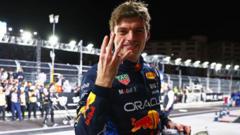Will Verstappen Stay at Red Bull After Horner's Departure?

The Future of Red Bull Racing: Navigating Changes and Challenges Ahead
In the high-stakes world of Formula 1, few stories captivate fans and analysts alike as much as the dynamics within a top team. Red Bull Racing, long recognized for its competitive edge and innovative engineering, now faces a critical juncture. With Laurent Mekies stepping in to replace Christian Horner as team principal, the focus sharpens on how this change will influence the team's performance and, most importantly, the future of star driver Max Verstappen. This article delves into the challenges Mekies faces, the implications of Horner's departure, and the overarching question of whether Red Bull can maintain its hold on its championship-winning driver.
The Context of Change: Why Horner's Departure Matters
Christian Horner's tenure at Red Bull Racing was defined by unparalleled success and a series of controversies. Over two decades, he led the team to four consecutive drivers' and constructors' championships between 2010 and 2013, establishing Red Bull as a dominant force in F1. However, his recent operational struggles, coupled with allegations of misconduct that stirred discomfort within the team, ultimately led to his dismissal.
For Max Verstappen, a driver known for his fierce competitive spirit, Horner's departure could signify a new beginning. While Verstappen's contract extends until 2028, the Dutchman has been increasingly courted by rival teams, notably Mercedes. His team believes that opportunities may exist for him to exit his current commitment if he so desires.
The Impact of the New Leadership
With Mekies at the helm, Red Bull Racing is poised for a significant shift in philosophy. His engineering background and extensive experience in F1, including roles at Ferrari and the FIA, set him apart from Horner’s more media-focused approach. Mekies' understated style may foster a more collaborative environment, potentially alleviating the internal tensions that became prevalent under Horner's leadership.
Max Verstappen: The Key to Red Bull's Future
Retaining Max Verstappen is paramount for Red Bull Racing. His exceptional skill on the track has made him not just a driver, but the face of the team. However, his recent remarks about the car's performance have raised concerns. As Red Bull struggles to maintain competitive speed, particularly against McLaren, the pressure on Mekies to provide a viable solution mounts.
Performance Challenges: The Current State of the Car
Despite Verstappen’s early-season success with four wins in the first five races of 2024, his performance has dwindled, reflecting deeper issues within the car's design and setup. Red Bull's inability to keep pace with McLaren highlights significant performance gaps, particularly in race conditions. While Verstappen can still secure pole positions, the car's overall race performance has faltered, putting added pressure on both driver and team principal.
- Verstappen has expressed dissatisfaction with the car's balance.
- The team has struggled to maintain a consistent performance across various circuits.
- McLaren's advancements have raised the competitive bar, leaving Red Bull trailing.
These performance inconsistencies indicate a potential disconnect between Verstappen's driving style and the car's design. As Mekies steps into his role, addressing these concerns will be critical to restoring the team's competitive edge and keeping Verstappen satisfied.
Engineering the Future: Mekies’ Strategic Vision
Mekies' engineering background is a double-edged sword. On one hand, his technical expertise may streamline Red Bull's design processes, fostering innovation and efficiency. On the other, the team faces the dual challenges of an upcoming regulatory shift in 2026 and the introduction of new engine technology.
Regulatory Changes and New Engine Developments
The 2026 engine regulations are anticipated to significantly alter the landscape of F1, with a shift towards more electrification and hybrid technology. As Red Bull prepares to develop its own engine in collaboration with Ford, the stakes are high. The current narrative suggests that Mercedes may have a head start in this area, adding to the urgency for Mekies to deliver results.
Key considerations for Mekies include:
- How to leverage Red Bull's engineering capabilities to stay competitive.
- Ensuring that the team is prepared for regulatory changes without losing sight of immediate performance needs.
- Building a cohesive technical team that can innovate under the new regulations while maintaining driver satisfaction.
A New Approach to Team Dynamics
Mekies' leadership style differs significantly from Horner’s, which may provide a fresh perspective that Red Bull desperately needs. His ability to foster a collaborative environment could be pivotal in retaining top talent and stabilizing the team amidst ongoing changes.
Addressing Internal Team Dynamics
The departure of key figures, including Adrian Newey and Jonathan Wheatley, has left a void within Red Bull Racing. Mekies will need to not only fill these gaps but also ensure that team morale remains high. This involves:
- Creating a transparent communication structure to rebuild trust.
- Encouraging feedback loops between drivers and engineers for improved car development.
- Addressing any lingering paranoia or tension from Horner's era, allowing team members to focus on performance rather than internal politics.
These changes may lead to a more robust and resilient team, better equipped to handle the pressures of F1 competition.
Conclusion: The Road Ahead for Red Bull Racing
The challenges facing Laurent Mekies are significant, but they also present an opportunity for Red Bull Racing to re-establish itself as a leader in Formula 1. Retaining Max Verstappen will be crucial, but it will require a concerted effort to address performance issues, stabilize the team, and navigate the complexities of a changing regulatory landscape.
As fans and analysts watch the unfolding drama, one question looms large: Can Red Bull Racing adapt quickly enough to retain its star driver and reclaim its status among the elite teams in Formula 1?
Frequently Asked Questions
What are the main challenges Laurent Mekies faces as Red Bull Racing's new team principal?
Mekies must address performance issues with the current car, stabilize team dynamics following Horner's departure, and prepare for upcoming regulatory changes in 2026.
How does Max Verstappen’s contract situation impact Red Bull Racing?
Verstappen's contract runs until 2028, but increasing interest from rival teams like Mercedes puts pressure on Red Bull to improve performance and job satisfaction.
What changes are expected in Red Bull Racing's approach under Mekies?
Mekies is expected to foster a more collaborative team environment, focus on engineering innovation, and address internal team dynamics to improve overall performance.
As Red Bull Racing embarks on this new chapter, the dynamics of Formula 1 will surely be influenced. What changes do you anticipate seeing in the upcoming races? #F1 #RedBullRacing #MaxVerstappen
Published: 2025-07-10 14:32:04 | Category: sport



